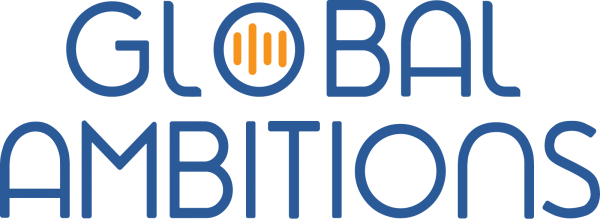With Emma Wallerstein, Localization Manager at Bitvavo
Below is an automated transcript of this episode
Antoine Rey (Host) 00:18
Hi everyone, my name is Antoine Rey and I’ll be your host today for this Global Ambitions podcast episode, and my guest today is Emma Wallerstein, who is the Localization Manager at Bitvavo, and today we’ll be talking about startup to scale up in a regulated environment. So, Emma, welcome to the program.
Emma Wallerstein (Guest) 00:35
Yeah, thanks, Antoine. Very excited to talk with you today. Really appreciate having this chat.
Antoine Rey 00:39
And to get started right away, like maybe you can explain for the listeners what Bitvavo is and a little bit of your one-person team history in there.
Emma Wallerstein 00:48
So Bitvavo is actually Europe’s leading crypto exchange and it’s sort of a really interesting place to work from a localization perspective because it was really kind of built for Europe from day one. We’re based in the Netherlands, but when you think about, for example, decentralized finance or crypto, that’s already kind of global by design, right, and so Bitvavo was also built in that way. Localization is really one of the core goals. We talk about it at our company meetings. Winning Europe through localization is one of our company priorities and even our CFO. Recently he was at a big crypto conference in Singapore and his whole presentation was called Localization Drivers of Crypto Adoption. So for me, working in localization at Bitvavo is pretty special. It’s already celebrated, everybody knows that it drives impact, people are aligned on the importance of it and you don’t really have to sell it. And it makes sense, right, because when you think about Bitvavo and you think about the success of Bitvavo, it really does hinge on understanding Europe, understanding our customers in Europe, and being able to adapt to those markets.
Antoine Rey 01:45
That’s amazing. You’re going to make a good few people listening very jealous.
Emma Wallerstein 01:49
Very jealous.
Antoine Rey 01:50
Sometimes it takes them years and years and it’s not always successful to go and sell the fact that localization is not just a cost center, that it is important and it will drive revenues. But then, despite that, or maybe like in parallel to that, I don’t know you have a one-team person, right? There is some level of investment, obviously, but it remains a one-team person, right?
Emma Wallerstein 02:20
Yeah, for now. Indeed, I think you know when we were talking about this idea of startup to scale up, and I think that’s something that Bitvavo is really working on. So, as I said, like, localization was always quite important at Bitvavo. Even before I started I’ve been there like about a year and a half there was already five languages plus English before I even began, but it was something that was managed in a way of more sort of reactive. I think we talked about this a lot and at some point you know, quite recently Bitvavo really realized okay, this is what’s going to drive us. That’s when I came on board and started making things a bit more finalized and really working from that sort of startup to scale-up model.
02:55
And I think, being a one person team I’ve always been a one person team it’s quite an interesting experience. It’s a fun experience. It’s also a bit challenging. It means that I own basically everything around localization, but it also means that I report to every single stakeholder. So it’s a lot about managing those expectations, building those relationships.
03:13
As a one-person team, I really want to align with everyone and I try to talk to them about not just what they’re doing and what content they want to localize, but also what are their goals, because that’s sort of where I see the ability for localization to make an impact is not just we have our own goals, of course, but to find out what are the goals of those teams that we’re supporting. And something that I think localization as a team that almost always works with every single member of the company, especially when you’re a one-person team right, we don’t have a marketing localization and a product localization and whatnot. That’s not the setup. When you’re working across the whole company, you really have an opportunity to create structures that can sort of scale up, right. That’s the idea is that we have one person, but we are managing all of this content, we’re managing all of these stakeholders, so how can we create structures that scale?
Antoine Rey 04:02
Okay, but is that not a challenge at the same time? Because I can imagine when you’re moving from reactive to a managed place which is what you’ve gone through or you’re in the middle of going through you have to be able, to the point we were making early on to scale up to the next level every time. To do that, your infrastructure probably needs to adapt and evolve, and you’re trying to change the engine while you’re flying the plane. That’s what it says and you’re one person, so how does that work? Or does that delay things, or does that?
Emma Wallerstein 04:33
Yeah, I mean, I think that that’s something that I really enjoy about it. I think it’s really easy, particularly like at a one-person team, at a scale up, when you’re going fast. The crypto industry in particular you can think about it as like super volatile or can be, so that’s something that I really like as a challenge because you have to get everything done right. There’s business as usual, day-to-day stuff, but you also want to take the space to sort of step back and say, ok, let’s look at these processes. How did they hinder our ability to do these day-to-day things you know well, or how did they support that? So I think that’s something that yeah, is a challenge but it’s also for me a fun of it. I get to say like, okay, I’m going to try this structure, I’m going to see how this supports our end-to-end content flow. Each time I run this structure, I’m going to take a step back and obviously have to be so organized. Right, I love a spreadsheet, but I’m going to take a step back to say, okay, what went right with this one? What was different?
05:28
Our internal documentation is massive. I hit that every day. Every time that something’s changing or that something works really well, I make sure that it’s documented there, and then I try it again and I really love template and kind of trying to figure out what are the processes, how do they work, how can we document them? And then, when we see that they don’t work or that they do work, how can we iterate on them to improve them for the next time. So it is managing all of that. But I’ve done this so many times that now I just see, well, yeah, if you take the time to actually document everything and templatize everything, that’s going to make those day-to-day things become less and less and less stressful and more and more and more successful.
Antoine Rey 06:05
That’s an interesting point to standardize your approach there, but still, it sounds like you have a one-superwoman team in this case.
Emma Wallerstein 06:14
I talked to all the stakeholders, right, and I try to look at what they’re doing and I also try to say how can we do that in a more organized way? And sometimes it can be especially at the beginning, right, I often have come in like when there was no localization or no formal localization, I should say. And so when you come in, people are really used to saying like, oh, like I just got Steve in accounting to translate this to French because he is French. Then the next time maybe they got Joanne to do it. So I try to show okay, and what’s the result of that? And they’re like, yeah, well, we’ve heard that the French isn’t always consistent Like, yeah, okay, let’s see what processes we can improve to make those things happen. So I think that’s what I was talking about.
06:51
I try to always talk what are your goals for localization? What’s your experience been in localization? Because you need those people to partner with you, because you’re just one person. You need to have them also be a part of this documenting and templatizing and giving the feedback. I find sometimes that it’s really easy to just go with your processes and never look at the feedback. But that’s what’s going to make the processes better. That’s what’s going to make the processes better. So that’s, I think, something that, as a one person team, is also extremely valuable to try to really partner with your stakeholders because they can kind of become part of your team.
Antoine Rey 07:20
And it’s finding the time to do that and also like I think you touched on something that is important for those teams: how do you contribute to their goals and OKRs because that’s gonna be important to report on at some stage.
Emma Wallerstein 07:35
I think that’s something I not really spent much time worrying about and maybe I’ve just been lucky that my companies are not so concerned about cost per word or let’s keep everything under this budget, or let’s make sure that these deadlines are very strict, and whatnot, so I’m really able to take on the goals of my stakeholders rather than just having my own kind of goals. At a former company, I said like well, what’s the budget? Like, what do I need to manage when these requests are coming in from all these different stakeholders? And my manager at the time said every activity that you work on has already been approved. We want this new feature, we want this marketing content, so I don’t spend so much time worrying about oh, can I keep everything under budget? I’m like these are the activities that the organization has identified as are going to drive our business, so I’m there to support that.
Antoine Rey 08:21
So tell me, now you have new regulation coming up in Europe, that means it’s going to have an impact.
Emma Wallerstein 08:27
Yeah, absolutely Most people don’t know about this. Crypto is still kind of niche, but on an EU level there’s some regulation coming in to effect next year called MICAR, and that stands for Markets in Crypto Assets Regulation, and it basically just means that if you are any EU-regulated crypto provider so a crypto provider who is regulated by a regulator in an EU member state they will actually be able to serve all the EU. So this is actually a super exciting opportunity for a few reasons. One, this is going to be super great for crypto in general. I think that users will feel a lot safer and a lot more confident to try crypto if they know that there’s regulators that are looking out for them. So, in general, like crypto adoption is, this is a really big benefit for that, but also for Bitvavo, we see an actual opportunity, especially in the EU, like a big gap in the competitors, to offer sort of a well-localized and really accessible user-friendly trading platform. So, of course, if we’re talking about a gap to fill with a well-localized product, then localization gets to play a big role, and I think there’s actually kind of two things.
09:33
Of course, we talk about localization as a driver of expansion, and I think everyone that’s listening to this podcast would totally agree. But when you think about tools that are financial products, that’s a particularly important thing. You have to establish trust and I think having a well-localized product that is accessible, that users can feel comfortable navigating, goes such a far way to establish that sort of base of trust. Crypto can be volatile.
09:59
Crypto trading can be quite complex, so you don’t really want users to try to navigate that in their second or, if you think about Europe, maybe their third or even their fourth language. That’s an experience I know for myself. I’m really not so comfortable managing money in a language that’s not English. So I think obviously everyone at Bitvavo knows that localization is going to be a driver of the expansion, but I also see localization can take a role in kind of generally the go-to-market. I think that as a manager of expansion, localization is really well positioned because of exactly what we were talking about before Localization works so much on aligning multiple stakeholders and that’s something that absolutely has to happen during a go-to-market process.
10:42
So I’m really excited to look at and set up those structures and also work on. Okay, every time we have a new market launch, can I take a step back? Can I look at what went well, what went wrong, how can I improve that and then take that and feed that back into the next launch. So I think that’s kind of you know, localization is still going to do its day-to-day of making sure that the experience is really adapted for the users, but it’s also going to take a role in making sure that the process of going to market is actually smooth and efficient and constantly being optimized.
Antoine Rey 11:14
Does that mean that you’re moving from I know you’re supporting six markets at the moment to potentially an extra 20 markets there?
Emma Wallerstein 11:21
I mean, I think that’s the possibility. We’re going to see how things go. Of course, I don’t think anyone’s going to commit to launching in 20 markets right away, but at least for me as a localization manager, I want to make sure that Bitvavo is set up, that we could add 10 languages in two months. We could add 20 languages in five months. So that’s where I’m looking at the structures and I’m looking at what’s scaling, what’s not scaling, both within the localization team but also wider in the company of where are opportunities for different teams to collaborate better or to collaborate in a way that’s a little less complicated.
Antoine Rey 11:53
Hopefully, they’ll help you with a few more hires in the team.
Emma Wallerstein 11:57
That would be great.
Antoine Rey 11:59
In such a regulated environment. How does, like AI comes into play from your point of view for localization? Are there restrictions?
Emma Wallerstein 12:06
Yeah, I think that, of course, obviously, GDPR, like there’s a lot of stuff that you’re not going to feed into AI engine. On my side, I’m trying to use AI more for the processes, right? So what can I automate? What can I make easier, even just when I’m thinking about, like, adding terms to the glossary? Well, can I just ask AI to give me a really simple explanatory sentence about what this term means, especially in crypto? You know, new terms come up every month.
12:36
It’s really kind of a fun challenge, but I think the compliance, legal and risk team at Bitvavo is massive and we’re always in discussions with them and that’s another part of, you know, making those structures and making those stakeholder alignment processes really tight is because you can’t go two months on a project and then ask legal and they say no. So I think AI is helping. On my side, I’m trying to use AI more to help me with the management and the structure and saying like, okay, here’s this process. What could be more efficient here? How can you? Can you help me document this, those kinds of things. With translations, I think it’s getting better and better, but it’s not something that we want to rely on yet, although a really nice job of making sure things are consistent, which is something that regulators. It’s extremely important to them that the wording is consistent, that the messaging is consistent. So those kinds of checks, I think, are something that AI can really support with.
Antoine Rey 13:24
Great. Well, it looks like you’re going to be busy for the next couple of years anyway, and that’s great news. So thanks very much for coming on the show, Emma. Really nice to speak with you and if you want to reach out to, Emma, we’ll have her details on the Global Ambitions sites there. Nice, yeah, lovely chatting with you. Really, really nice talk.
Emma Wallerstein 13:39
Nice, yeah, lovely chatting with you. Really, really nice talk.





